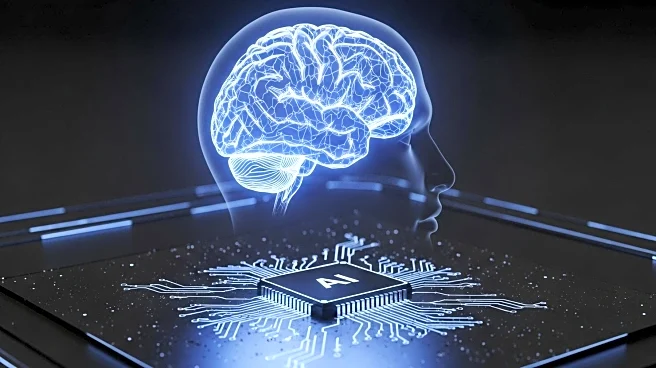What's Happening?
A recent study has highlighted the differences between human and AI capabilities in predicting memory performance. The research focused on the metacognitive abilities of large language models (LLMs) like GPT-4o, comparing them to human judgments of learning (JOLs). The study found that humans can reliably predict which information will be remembered, while LLMs struggle to do so accurately. This was demonstrated through a language-based memory task involving sentence pairs with varying contextual relevance. The findings underscore a fundamental difference in how humans and AI models perceive and predict memorability, with humans showing a significant positive relationship between JOL and correct recall.
Why It's Important?
The study's findings have significant implications for the use of AI in educational and psychological research. AI's current limitations in predicting memory performance could hinder its effectiveness in personalized learning and adaptive teaching methods. This gap in AI's predictive capabilities may lead to student frustration and reduced engagement. Moreover, the inability of LLMs to accurately predict memory performance highlights the need for improved AI models that can better mimic human cognitive processes. Addressing these limitations could enhance AI's role in education and other fields, making it a more reliable tool for assessing and supporting human learning.
What's Next?
Future research may focus on improving AI's metacognitive abilities through task-specific training and advanced prompting strategies. Enhancements in AI models could lead to more accurate predictions of human memory performance, potentially increasing their application in educational settings. Additionally, exploring the integration of explicit memory mechanisms in AI could help bridge the gap between human and AI cognitive processes. As AI continues to evolve, addressing these challenges will be crucial for developing more autonomous and effective models that require less human oversight.
Beyond the Headlines
The study also touches on the broader implications of AI's limitations in metacognitive tasks. The autonomy-control tradeoff highlights the shift from human control to AI autonomy in task management. Strengthening AI's monitoring capabilities could lead to more autonomous models, reducing the need for human intervention. This could enhance interactions between humans and AI, making them less mentally demanding and more efficient. The research suggests that improving AI's metacognitive skills is essential for achieving greater independence and smoother interactions in various applications.









